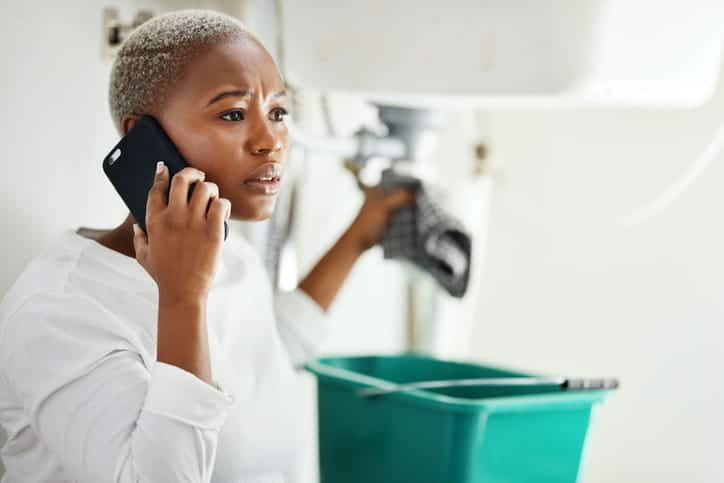When a plumbing emergency happens, it can cause unimaginable damage. Knowing what to do before, during, and after a plumbing emergency is key. Today, we’ll take a closer look at everything you need to know about plumbing emergencies so you can remain calm and prepared when a plumbing issue does arise.

Work with the best Las Vegas emergency plumber when you contact the team at Larkin Plumbing. From plumbing maintenance to water damage prevention, our team has you covered.
Call Larkin Plumbing for all your plumbing emergencies. Contact us today.
What Are the Most Common Plumbing Emergencies?
More often than not, plumbing emergencies result from smaller-scale plumbing issues that have either gone undetected or are not maintained properly — below are some of the most common problems that can turn into plumbing emergencies:
Overflowing Toilets
Your bathroom is one of the most frequently used locations in your home, and as such, you’ll encounter a backed-up or overflowing toilet every now and again. While using a plunger can keep the water moving, an overflowing toilet can indicate you have backed-up pipes that need to be fixed.
Clogged Sink Drains
If you notice your sinks are not draining as quickly as you feel they should or as they once did, there’s a clog somewhere along the drain system. The clog could be a simple fix or may require the expertise of a professional.
Burst Pipes
When a significant amount of water pressure builds up in your plumbing and comes across a joint of a pipe or a rusted pipe, a pipe burst can happen.
Leaking
It’s estimated that water leaks account for roughly 14% of all property damage claims. The leak can happen within the pipe, a leaky faucet, a toilet, or another fixture.
What Should I Do in Case of a Plumbing Emergency?
Plumbing emergencies can range from mild to severe. No matter the emergency, however, it’s important to know how to control what is happening to minimize the damage. Here’s what to do in the event of a plumbing emergency:
Turn off Your Water Supply
In any plumbing emergency, you should first turn off the water supply at your shut-off valve. This will stop the flow of water and prevent any water damage. In most homes, you’ll find a wheel (gate valve) or a straight handle (ball valve) that shuts off the water supply. This can be located in your basement, garage, or outside, depending on your home.
If you have a gate valve, turn it clockwise until the water is off. If you have a ball valve, turn the handle clockwise a quarter of a full turn until the water is off.
Related: The Basics of Plumbing for New Homeowners
Turn off Your Hot Water System
In addition to turning off your water supply, you’ll also need to turn off your hot water system. This prevents your water heater from overheating or even bursting. After shutting these valves off, minimize the damage by using buckets, rags, and other items to clean up any leaking water and prevent further damage.
Call a Plumber
Call a trusted plumber immediately. A plumber will assess the lead, determine the next steps, and repair the leak so that there is no further threat to your pipe system.
How Can I Prevent Plumbing Emergencies?
As with most things in life, an ounce of prevention is worth a pound of cure. There are things you can do during your everyday life that can help minimize your risk of a plumbing emergency. Below are some of those tips:
Know Where Your Water Shut-off Valve Is
Get familiar with where your home’s plumbing shut-off valve is and how to use it. It can also be helpful to teach this to everyone who lives in your home.
Your home’s plumbing arrangement or the type of foundation you have will determine where your water supply valve is located. Generally, your water shut-off valve will be in one of these locations:
- Crawl space
- Outside — this is often the case if you live in a warmer climate
- The basement
- The garage
Don’t Flush Flushable Wipes
Flushable wipes are convenient, and they are advertised as being safe for flushing down the toilet. Still, it’s best that you avoid flushing them all together. A flushable wipe itself is not an issue, but if you do use flushable wipes and your piping system is already compromised with a clog, flushable wipes can exacerbate the situation.
Never Pour Grease Down Your Drain
Grease, fat, and cooking oils are generally liquid, but if you pour them down a drain, they will solidify, contributing to a clog that can attract debris. The best practice is to wait until fatty oils solidify and throw them in the trash instead of pouring them down the drain.
Your Garbage Disposal Is Not a Trash Can
Garbage disposals help grind larger items into smaller pieces that can flow through your drainage system. Still, don’t get in the habit of using your garbage disposal as a trashcan.
Have the Right Tools on Hand
If an emergency happens, having the right tools on hand can make a difference. Some helpful tools every homeowner should have in the event of a plumbing emergency include:
- Bucket to collect leaking water
- Plunger for clogged toilets or drains
- Pliers
- Pipe wrench
When Should I Call a Professional Plumber?
If you are experiencing a plumbing emergency, you should call a professional immediately after following the above steps to stop the water flow. You should also call a professional if you are experiencing any of the following:
- You suspect a pipe has burst but don’t know where
- You are experiencing flooding and are not sure why
- There is a leak in your home’s foundation or ceilings
- You are experiencing leaks during harsh weather
- You have toilets and sinks that regularly back up
- You are experiencing other sewage issues
Contact Larkin Plumbing Today
Work with a trusted Las Vegas plumber when you contact the team at Larkin Plumbing. We are proud to be a leading Las Vegas emergency plumber and will help you with all your plumbing maintenance and emergency concerns.
Contact Larkin Plumbing today!
Sources:
Brumberg, R. (2024). Water Damage Insurance Claims Statistics.
Preventing Water Damage Trends, risks, and mitigation for water leaks, pipe bursts and plumbing issues. (2024).
Types of Water Shut-Off Valves. (2024).

